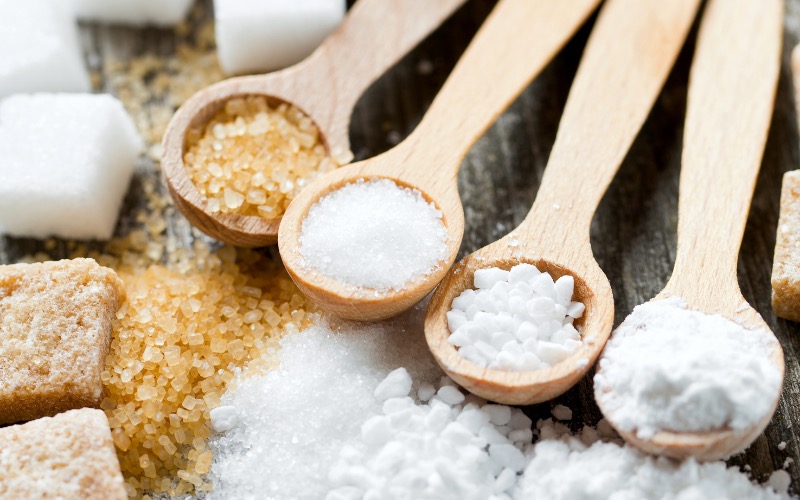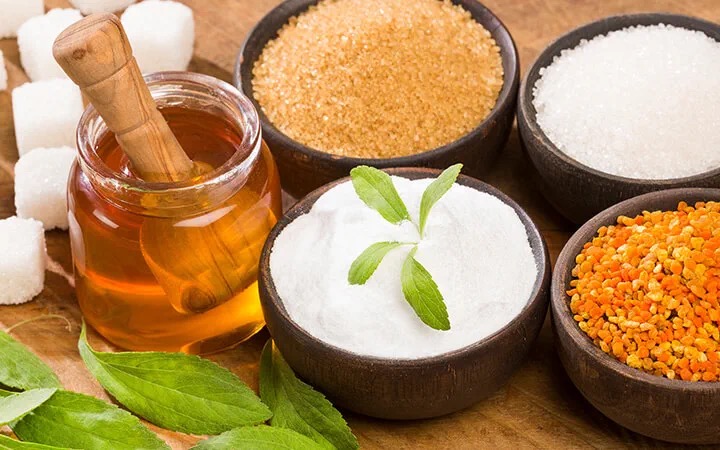Views: 222 Author: Sara Publish Time: 2025-07-14 Origin: Site








Content Menu
● Do Artificial Sweeteners Cause Cavities?
● Natural Sweeteners and Dental Health
>> Xylitol: The Cavity Fighter
● Functional Polyols: Beyond Sweetness
● Dietary Fiber and Oral Health
● The Impact of Sweeteners on Oral Microbiome
● Sweeteners in Healthcare and Food Manufacturing
● Best Practices for Using Sweeteners to Protect Teeth
● FAQ
>> 1. Do all sweeteners prevent cavities?
>> 2. Can sugar-free drinks still harm my teeth?
>> 3. Is stevia safe for teeth?
>> 4. How do polyols help oral health?
>> 5. Does dietary fiber affect cavities?
Sweeteners have become an integral part of modern diets, especially as consumers seek healthier alternatives to traditional sugar. With the increasing prevalence of artificial and natural sweeteners in foods, beverages, and even healthcare products, questions about their impact on dental health are more relevant than ever. One of the most common concerns is whether artificial sweeteners can cause cavities, a major oral health issue worldwide. This article explores the science behind sweeteners, their effects on teeth, and the best choices for maintaining a healthy smile.

Sweeteners are substances used to provide a sweet taste to foods and drinks. They can be broadly categorized into:
- Natural Sweeteners: Derived from plants or natural sources such as stevia, monk fruit, xylitol, and erythritol.
- Artificial Sweeteners: Synthetically produced to mimic the sweetness of sugar, including aspartame, sucralose, and saccharin.
- Functional Polyols: Sugar alcohols like xylitol, sorbitol, and erythritol, often used in sugar-free products.
Sweeteners are popular not only for their low-calorie content but also for their potential health benefits, such as blood sugar management and dental protection.
Cavities, or dental caries, develop when bacteria in the mouth metabolize fermentable carbohydrates (mainly sugars) and produce acids. These acids erode tooth enamel, leading to decay. The process involves:
1. Sugar Consumption: Bacteria feed on sugars left on teeth.
2. Acid Production: Bacteria produce acids as a byproduct.
3. Enamel Erosion: Acid attacks the tooth enamel, causing demineralization.
4. Cavity Formation: Prolonged acid exposure leads to cavities.
This process is influenced by factors such as oral hygiene, saliva flow, diet, and the type of sweeteners consumed.
Artificial sweeteners are generally considered non-cariogenic, meaning they do not contribute to tooth decay. Unlike sugar, most artificial sweeteners are not fermentable by oral bacteria, so they do not produce acids that erode enamel.
Artificial sweeteners cannot be metabolized by the bacteria in the mouth, which means they do not provide the food source bacteria need to produce harmful acids. As a result, replacing natural sugars with artificial sweeteners can help reduce the risk of cavities.
However, some products containing artificial sweeteners may still be acidic, such as diet sodas and sugar-free candies. These acidic components can erode enamel and indirectly contribute to dental problems. Therefore, it is important to differentiate between the sweetener itself and the overall formulation of the product. Even if a product contains non-cariogenic sweeteners, its acidity can pose a risk to dental health if consumed excessively.
Among natural sweeteners, xylitol stands out for its dental benefits. Studies show that xylitol can actively reduce the presence of cavity-causing bacteria (Streptococcus mutans) and stimulate saliva production, which helps neutralize acids and remineralize enamel.
Xylitol works by interfering with the bacteria's ability to adhere to the teeth and produce acid. It also encourages saliva flow, which naturally protects teeth by neutralizing acids and providing minerals to repair enamel. Chewing gum or mints containing xylitol are often recommended by dental professionals as part of cavity prevention strategies.
Other polyols, such as erythritol and sorbitol, are also non-cariogenic. Erythritol, in particular, has been shown to be even more effective than xylitol in reducing dental plaque and cavity formation. Sorbitol is less effective than xylitol but still a safer alternative to sugar in terms of cavity risk.
These sugar alcohols are widely used in sugar-free chewing gums, candies, and oral care products, providing sweetness without the harmful effects of sugar.
Functional polyols are sugar alcohols that provide sweetness without the cariogenic effects of sugar. Their benefits include:
- Low or zero calorie content, making them suitable for weight management.
- Non-cariogenic properties, meaning they do not contribute to tooth decay.
- Reduced plaque formation, which lowers the risk of cavities and gum disease.
- Support for oral health in sugar-free products, such as gums and toothpaste.
These polyols are increasingly popular in the food and beverage industry, especially in products targeting health-conscious consumers and those with diabetes.

While not a sweetener, dietary fiber plays a significant role in oral health. High-fiber foods stimulate saliva production, which is the mouth's natural defense against cavities and gum disease. Saliva helps wash away food particles, neutralize acids, and support the oral microbiome.
Eating more fiber (22-30 grams daily) has been shown to improve markers related to gum disease, such as reducing swelling, decreasing plaque buildup, and improving the support structures around teeth. High-fiber fruits, vegetables, and whole grains not only benefit overall health but also contribute to a healthier oral environment.
The oral microbiome, a complex community of bacteria living in the mouth, plays a crucial role in dental health. Certain bacteria promote tooth decay, while others help maintain a balanced environment. Sweeteners influence this microbial balance differently.
- Sugar feeds harmful bacteria, leading to acid production and enamel erosion.
- Artificial sweeteners generally do not support bacterial growth, helping maintain a healthier balance.
- Xylitol and erythritol actively inhibit harmful bacteria and promote beneficial species.
Maintaining a balanced oral microbiome through proper diet and oral hygiene can reduce cavity risk and improve gum health.
In the food, beverage, and healthcare industries, sweeteners are essential ingredients for developing products that meet consumer demands for healthier options. Factories specializing in natural sweeteners, functional polyols, and dietary fibers provide OEM/ODM services to manufacturers worldwide, offering:
- Custom blended sweeteners tailored to product needs.
- Tablet and powder production for supplements and oral care products.
- Formulations that optimize sweetness while minimizing cariogenic risks.
These innovations help companies produce sugar-free, low-calorie, and tooth-friendly products that support consumer health.
To maximize the dental benefits of sweeteners and minimize risks:
- Choose products with non-cariogenic sweeteners such as xylitol, erythritol, or stevia.
- Avoid frequent consumption of acidic sugar-free beverages.
- Use sugar-free chewing gum containing polyols to stimulate saliva.
- Maintain good oral hygiene by brushing twice daily and flossing.
- Incorporate a diet rich in fiber and low in fermentable sugars.
- Regularly visit the dentist for check-ups and professional cleanings.
Artificial sweeteners, as well as most natural sweeteners like xylitol, erythritol, and stevia, do not cause cavities. In fact, some sweeteners actively protect against tooth decay by inhibiting harmful bacteria and promoting saliva production. However, the acidity of some sugar-free products and overall dietary habits still play a role in oral health. Choosing the right sweeteners and maintaining a balanced diet rich in fiber can significantly reduce the risk of cavities and support overall dental well-being.

Not all sweeteners are created equal. While most artificial and natural sweeteners are non-cariogenic, only some—like xylitol and erythritol—actively protect against cavities by reducing harmful bacteria and promoting saliva production.
Yes. Many sugar-free drinks contain acids (such as citric or phosphoric acid) that can erode enamel, even if they use non-cariogenic sweeteners. Always check the acidity of beverages and consume them in moderation.
Stevia is a natural sweetener that is not fermentable by oral bacteria, making it safe for teeth and a good alternative to sugar.
Polyols like xylitol and erythritol are non-cariogenic and can reduce plaque, inhibit bacterial growth, and stimulate saliva, all of which contribute to better oral health.
Dietary fiber doesn't directly prevent cavities, but high-fiber foods stimulate saliva production, which helps protect teeth from decay and supports healthy gums.
